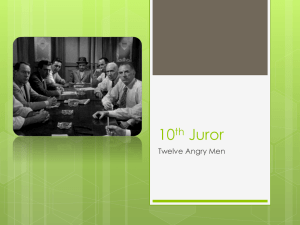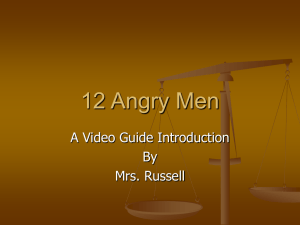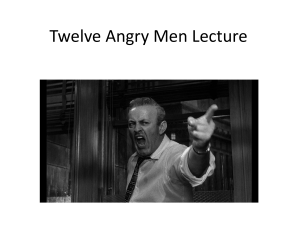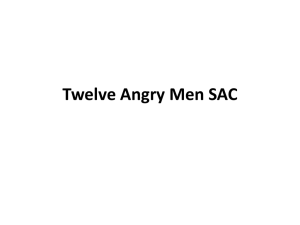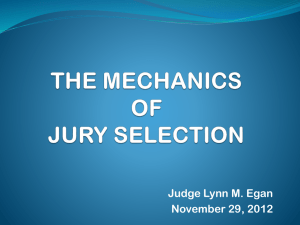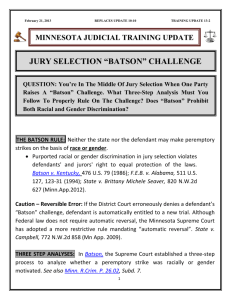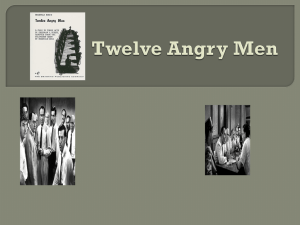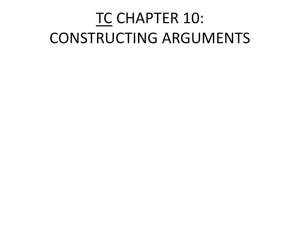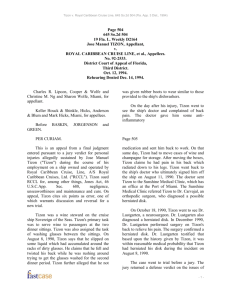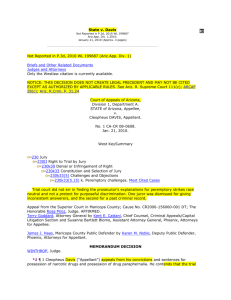"Twelve Angry Men" Essay: Facts vs. Fancy
advertisement
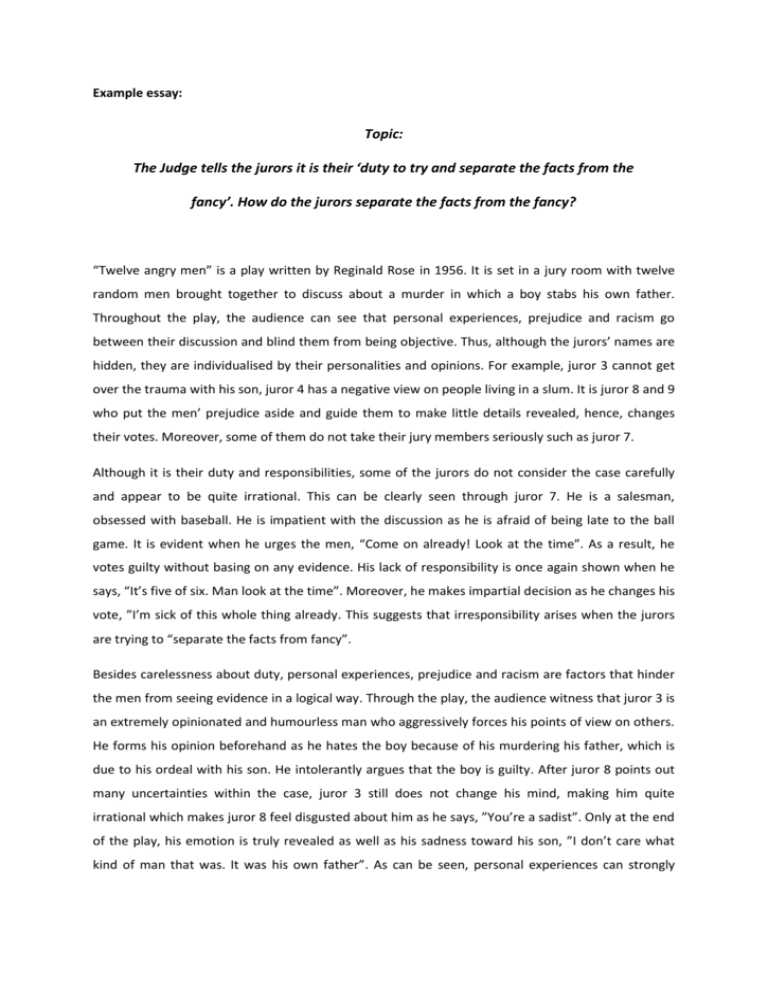
Example essay: Topic: The Judge tells the jurors it is their ‘duty to try and separate the facts from the fancy’. How do the jurors separate the facts from the fancy? “Twelve angry men” is a play written by Reginald Rose in 1956. It is set in a jury room with twelve random men brought together to discuss about a murder in which a boy stabs his own father. Throughout the play, the audience can see that personal experiences, prejudice and racism go between their discussion and blind them from being objective. Thus, although the jurors’ names are hidden, they are individualised by their personalities and opinions. For example, juror 3 cannot get over the trauma with his son, juror 4 has a negative view on people living in a slum. It is juror 8 and 9 who put the men’ prejudice aside and guide them to make little details revealed, hence, changes their votes. Moreover, some of them do not take their jury members seriously such as juror 7. Although it is their duty and responsibilities, some of the jurors do not consider the case carefully and appear to be quite irrational. This can be clearly seen through juror 7. He is a salesman, obsessed with baseball. He is impatient with the discussion as he is afraid of being late to the ball game. It is evident when he urges the men, “Come on already! Look at the time”. As a result, he votes guilty without basing on any evidence. His lack of responsibility is once again shown when he says, “It’s five of six. Man look at the time”. Moreover, he makes impartial decision as he changes his vote, ”I’m sick of this whole thing already. This suggests that irresponsibility arises when the jurors are trying to “separate the facts from fancy”. Besides carelessness about duty, personal experiences, prejudice and racism are factors that hinder the men from seeing evidence in a logical way. Through the play, the audience witness that juror 3 is an extremely opinionated and humourless man who aggressively forces his points of view on others. He forms his opinion beforehand as he hates the boy because of his murdering his father, which is due to his ordeal with his son. He intolerantly argues that the boy is guilty. After juror 8 points out many uncertainties within the case, juror 3 still does not change his mind, making him quite irrational which makes juror 8 feel disgusted about him as he says, ”You’re a sadist”. Only at the end of the play, his emotion is truly revealed as well as his sadness toward his son, ”I don’t care what kind of man that was. It was his own father”. As can be seen, personal experiences can strongly affect the way in which jurors examine the testimony, typically in this situation, juror 3’s own experience blinds him from seeing the evidence presented in the case. Not only do personal experiences curb objectivity, but so do prejudice and racism. In Act I, the audience witness juror 4 ‘s prejudice about people living in a slum as he says, “Children from slum backgrounds are potential menaces to society”. He holds a negative view on the boy since he grows up in a slum area. In addition, juror 10’s prejudice is revealed here when he presents his point f view, “The kids who crawl outa those places are real trash”, supporting and adding to juror 4’s bias. Later on in Act II, juror 7 gives his racist rant to juror 11 as he gets frustrated by juror 11’s judgment and assessment about him, “I’ll knock his goddamn Middle European head off”. All of the above shows that their inability to push the personal aside is in some ways weak for not possessing the inner strength to overcome personal bias. The case is solved thanks to juror 8’s intelligence and logic and juror 9’s observation. Juror 8 is the only one who stands alone against 11 people to vote “not guilty”. He does not say the boy is not guilty, he just ensures things in a jury room go exactly the same as it is intended. He shows sympathy towards the boy when he reasons, “It is not easy for me to raise my hand and send a boy off to die without talking about it first”, depicting his desire to bring justice in the jury room. He appears thoughtful and tactical as he keeps reminding the men that if they have any “reasonable doubt” they must acquit and he also appreciates reasonable doubts as “a safeguard that has enormous value in our system”. Also, juror 8 states out a point which is as a reminder for the men to push their personal aside, “It is hard to keep prejudice out of a thing like this. Prejudice obscures the truth”. Moreover, he, along with juror 9, brings little details out of darkness which eventually leads to the verdict of not guilty. Thanks to his personal circumstances, juror 9 has a high degree of perception. He is able to identify many inconsistencies within the case, for example, “for an old man who had a stroke it’s a long walk”, “Heavy make-up. Dyed hair. Brand new clothes that should have been worn by a younger woman”, which is supportive of juror 8, hence, helps him to bring out “reasonable doubts”. From the above, it cannot be denied that juror 8 and 9 play a major role in separating “facts from fancy”. All in all, although personal experiences and prejudice hamper the search for justice, the twelve men unanimously reach the verdict of “not guilty”. It is effort of the twelve men to overcome their personal to give out one unique decision. Through the play, Reginald Rose demonstrates how things could go out of track if there were personal bias getting in the way. Word count: 983
